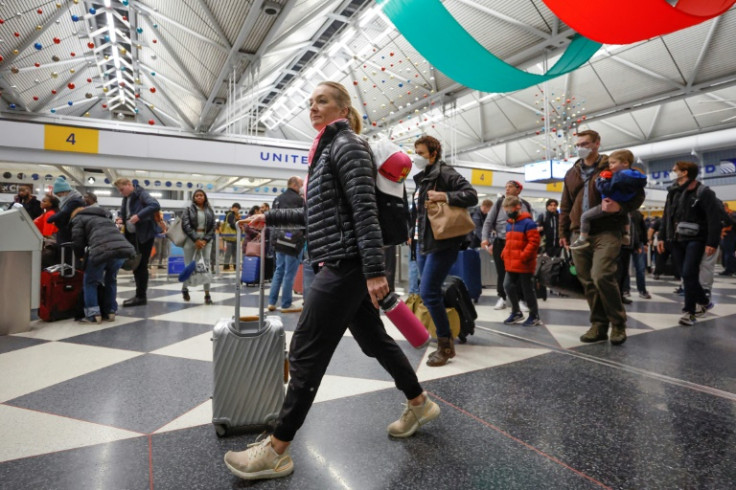Travel stocks are expected to soar in the post-pandemic world
People are increasingly looking to travel internationally once again, leading to a rise in the travel industry, which had previously contributed 6.7 per cent of all gross value added in the UK in 2018.

The increased desire to travel in the post-pandemic world has led to a rapid rise in the holiday market. Driven by the demand for adventure, the travel sector, which continues to grow, is expected to make a full recovery in 2019.
As COVID-19 slowly becomes a thing of the past, here's everything you need to know about the trends in the travel stock market.
How the COVID-19 outbreak impacted the travel and tourism industries
The travel and tourism industries contributed 6.7 per cent of all gross value added in the UK in 2018. However, COVID-19 greatly impacted the sector in 2020 and 2021 due to the heavy restrictions and bans on both national and international travels.
In an attempt to curb the on-spread of the highly contagious virus, countries around the world experienced multiple lockdowns and strict travel restrictions. In the UK, a nationwide lockdown was announced on March 23rd, 2020, a week after unnecessary travel was discouraged. These lockdowns continued to negatively impact the travel industry into 2021, following which, the pandemic's toll on the world started to reduce significantly as the year came to an end.
Renewal of tourism sectors in 2022 and its growth in 2023:
As COVID-19 entered its endemic stage, most of the travel restrictions were lifted or relaxed in a large number of countries in 2022. The lockdowns had led to a lot of pent-up demand globally, therefore, the travel and tourism industry started to bloom as people started to pack up their bags and travel again.
Due to this, international tourism saw significant growth in 2022, with over 900 million people travelling abroad. This was more than twice the number from 2021 but still 37 per cent less than in 2019.
According to the World Tourism Organisation's (UNWTO) scenarios presented in May 2022, international tourism recovered 63 per cent of its pre-pandemic levels. The UNWTO also predicted that inbound tourism spending will exceed $1.4 trillion (£1.14 trillion) globally in 2023.
International tourism is expected to make a significant recovery in 2023. According to UNWTO's scenarios for 2023, international tourist arrivals could reach 80 per cent to 95 per cent of pre-pandemic levels this year.
Top 5 travel stocks you should look out for in 2023:
More people are looking to travel internationally as it is now simpler and less stressful than it was a year ago. While the prices of airlines, hotels and more have increased, the demand has not decreased.
According to Maxim Manturov, Head of Investment Research at Freedom Finance Europe, the travel stocks listed below are set for growth as the industry continues to recover. The travel industry is projected to increase by 13.86 per cent, reaching $451.19 billion (£373.65 billion) during the years 2022 to 2026.
Here are five travel stocks to watch in 2023:
- TripAdvisor (TRIP)
- Expedia (EXPE)
- Boeing (BA)
- Airbnb (ABNB)
- Booking Holdings (BKNG)
What makes them so special?
Let's start with TripAdvisor, the largest travel metasearch company in the world, which offers information about 8 million hotels, restaurants, experiences, airlines, and cruise lines along with over 1 billion reviews.
In 2021, 74 per cent of the company's revenue came from its core segment, which includes hotel revenue produced by advertising on its metasearch platform. 20 per cent of revenues in 2021 came from Viator, its impressions brand. Meanwhile, 9 per cent came from TheFork, its restaurant brand, however, about 3 per cent of sales were inter-segment and excluded from consolidated revenue.
TripAdvisor's average target price is $30 (£24.5), with a potential to increase by 58 per cent.
Expedia, on the other hand, is the world's second-largest online travel agency by bookings. It offers bookings, accommodations, airfare, car rentals, cruise lines, destinations and advertising revenue. Accommodation accounted for 75 per cent of its sales in 2021. The agency operates a number of branded travel booking sites including Expedia.com, Hotels.com, Travelocity, Orbitz, Wotif, AirAsia and Vrbo.
It has also expanded into travel media with the acquisition of Trivago. The average target price for this stock is $133 (£109.5) with a potential to increase by 38 per cent.
Third on the list is Boeing Co., a major aerospace and defence company. It is a multinational corporation that operates in four segments which are commercial aircraft, defence, space and security, global services, and Boeing Capital. Boeing designs, manufactures and sells aeroplanes, rotorcraft, rockets, satellites, telecommunications equipment and missiles worldwide. Boeing's commercial aircraft segment competes with Airbus in the production of aircraft with a capacity of 130 seats or more.
The average target price for shares is $261 (£212), with a potential to increase by 27 per cent.
We've all used Airbnb at least once. The company is the largest online travel agency for alternative accommodation, founded in 2008, offering boutique hotels and experiences to its customers. With 4 million hosts, the company has listings in 220 nations and over 100,000 cities and towns. All of its revenue is made by the transaction fees for online bookings.
Airbnb has a target price of $140 (£115) and an upside potential of 14 per cent.
Last, but certainly not least, is Booking Holdings, the world's largest online travel agency by revenue. The agency provides booking and payment services for hotels, alternative rooms, airline tickets, rental cars, restaurant tables, cruise lines, and more. The business runs several well-known travel booking websites, such as Booking.com, Agoda, OpenTable, and Rentalcars.com, and after acquiring Kayak and Momondo, it has entered the travel media space.
Transaction fees make up a large part of Book Holdings' revenue for online bookings, with profits bringing the target price to $2,900 (£2,363) and a potential growth of 14 per cent.
© Copyright IBTimes 2025. All rights reserved.

















